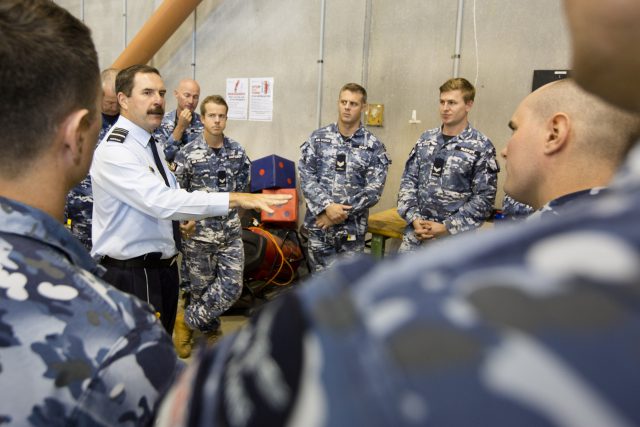RAAF chief Leo Davies: we face the greatest evolution of air power in our history
Posted By Brendan Nicholson on March 20, 2018 @ 11:15

As nations in the Indo-Pacific become stronger economically and militarily, Australia needs a potent air force with a sharp-enough technical and tactical edge and ‘information warfare’ skills to defeat potential adversaries, air force chief Leo Davies has warned.
Opening the 2018 Air Power Conference in Canberra today, Air Marshal Davies noted that ‘we live in an age of disruption’. He said the shift of the geostrategic centre from the North Atlantic and Europe to the Indo-Pacific was the most significant shift in the global balance of power since the end of World War II.
Describing the impact of ‘air power in a disruptive world’, Air Marshal Davies said the information and communications revolution, the global increase in economic development, economic linkages and interdependencies, and competing forms of political and ideological movements had made the early 21st century a more dynamic strategic environment. Nowhere was this more evident than in the Indo-Pacific.
This unprecedented sharing of economic wealth and technical development meant more players—states, actors, businesses, communities—could exert influence, he said. ‘This means that sometimes these disruptors cause friction. And this friction requires management: shaping where necessary, but certainly influencing and—at times—direct action.’
‘More nations are investing in high-end warfighting capabilities, challenging what historically had been a Western advantage,’ Davies said. The rate of change in the region was faster than at any other time in history and the convergence of these trends was creating a new set of national security challenges.
Prosperity had enabled nations throughout the region to invest significantly in their militaries—a legitimate response aimed at protecting their interests. They had easy and affordable access to sophisticated technologies, enabling pre-industrial societies to leap straight to the digital age, bypassing industrial development. The impact of economic power would become even more pronounced as military power grew to match.
The air force chief said air power’s reach, speed and precision remained important elements of a nation’s defence strategy. ‘Investments in stealth, networks, ISR and precision weapons are no longer a guarantee of capability overmatch. We now need to seek alternate solutions to reinstate a military superiority.’
Over 20 years, Asia’s share of global manufacturing had increased from around 30% to over 50%, and rising economic powers would continue that transformation. The United States now faces challenges that are driving a refocus of its foreign policy.
The new US National Defense Strategy [1] identified the re-emergence of long-term, strategic competition with ‘revisionist powers’ as its principle priority, Air Marshall Davies said. ‘This is a shift away from its more recent focus on asymmetric warfare—including counter-terrorism operations—and the maintenance of peace and order in an otherwise relatively stable global environment.’
He said this new power balance was emboldening some states to challenge the rules-based order. ‘Terrorists and organised crime have always looked for ways to get around the system. We are used to them not playing by the rules. But now some states are also looking to operate in the grey zone, exploiting the vulnerabilities of free societies, markets and global communications.’
Air Marshal Davies said the 2016 Defence White Paper had committed almost $100 billion to RAAF air power systems. ‘This will not just bring into service new platforms, but also a transition to “information warfare” with unprecedented demands on data collection, processing and exploitation.’
Effective employment of an integrated and networked force, to gain decision superiority and enable manoeuvre despite any intent to deny the same, was the hallmark of a fifth-generation force.
‘Such a change demands ingenuity, requiring a workforce that is empowered to think and act outside of the traditional norm. Innovation is essential to the realisation of the full potential of this investment. Our next generation of airmen must develop professional mastery that extends beyond mission specialisations. It must promote critical thinking, strategic understanding, innovative problem solving, collaboration and leadership—this is not business as usual,’ Air Marshal Davies said.
‘Airpower begins and ends with people and teams. A technical network alone is nothing.’
Air Marshal Davies said Australia was not ‘destined’ for war, but that the complexity of the environment and severity of the possible consequences meant it couldn’t be complacent:
I don’t know what the next conflict will be, but I do know that many of the tools of trade are now more freely available to potential adversaries than ever before. In future conflicts we can expect bases and support infrastructures, including civilian infrastructure, to be targeted through the use of physical and non-physical effects. These are no longer sanctuaries immune from attack.
The role of the ADF, to protect Australia and its interests, remains as relevant as ever in this dynamic and disruptive world. For the air force this equates to the delivery of the seven airpower roles—control of the air, strike, air mobility, ISR, C2, force protection, force generation and sustainment. We have seen that air power can strike deep; integrated with the joint force, it can generate decisive effect.
Today, air power provides support to troops on the ground, and critical visibility for commanders. Analytic, situational awareness and communications capabilities increasingly provide the full range of air power support to our joint and coalition engagement.
‘We need it to do more. Our air force is already capable. But it is now facing the greatest evolution of airpower in its history,’ he said. Success in the future battlespace requires the coordination of joint effects across all domains—a system of systems.
‘Airpower must be comprehensively integrated across the joint force to contribute meaningfully to the future fight.’
Article printed from The Strategist: https://www.aspistrategist.org.au
URL to article: https://www.aspistrategist.org.au/raaf-chief-leo-davies-face-greatest-evolution-air-power-history/
URLs in this post:
[1] National Defense Strategy: https://www.defense.gov/Portals/1/Documents/pubs/2018-National-Defense-Strategy-Summary.pdf
Click here to print.